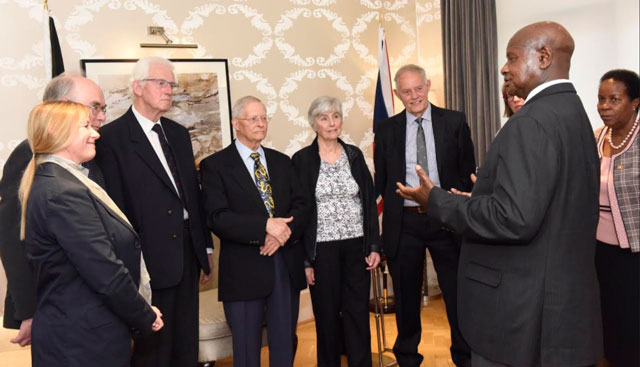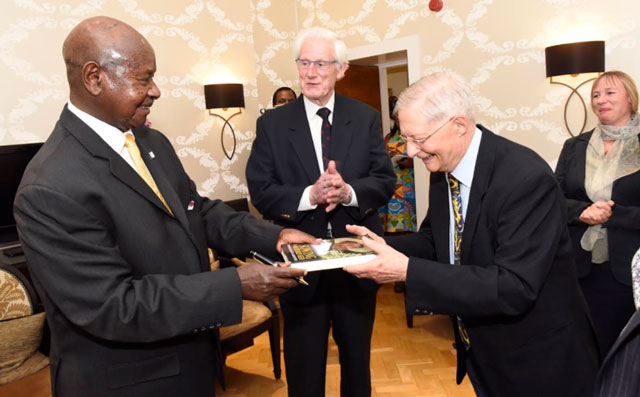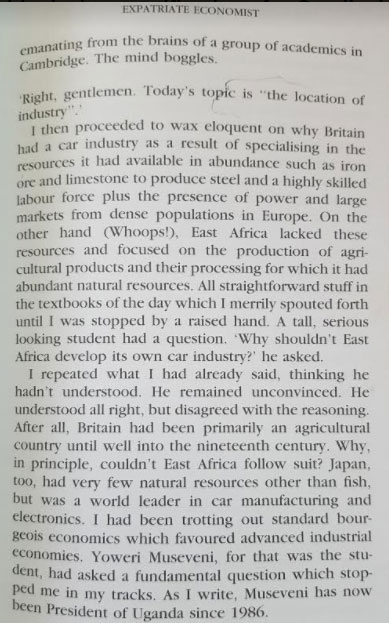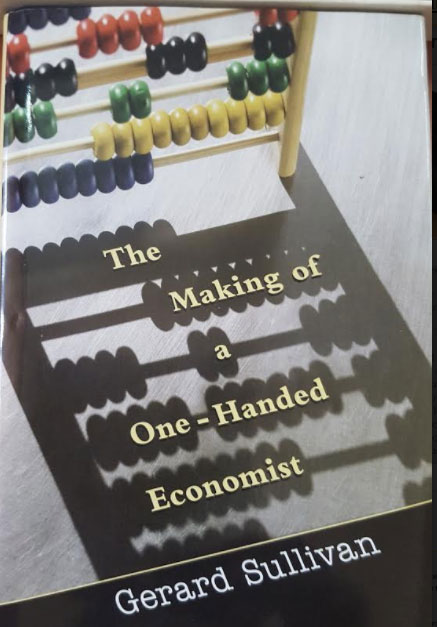
President Museveni meets former teacher who saved him from chickenpox
London, UK | PPU| Sometime in 1963, a student at Ntare School came down with a serious fever, with a temperature of over 104 degrees Fahrenheit. This was strange considering that the normal body temperature is said to be about 98.6 degrees Fahrenheit (37 degrees Celsius).
The ill teenager was Yoweri Museveni. The incident led to the closure of the school for health reasons, with the teacher who housed the teenager himself getting the illness – chickenpox.
Fifty four years later, teacher Gerald Sullivan, with a book The Making of a One-Handed Economist in hand, met Museveni, with Sowing the Mustard Seed in hand, in London last week. The meeting brought back school memories for the now Ugandan President, and, the UK based retired teacher.
“According to one of my teachers who took the temperature, I was practically dead. The temperature was too high. I was taken to hospital and I became delirious,” Museveni said, as he recalled how one of his teachers Sullivan saved him from chickenpox.
During his two day working visit to the United Kingdom last week, the president met his former economics teacher Sullivan and his wife Mary Sullivan. They were accompanied by a former headteacher of Mbarara High School John and Ailsa Nicholsan and Brian Remmer and Maurice Reeve a former English teacher.
The nostalgic meeting raked in emotions from a teacher who taught a young man he described as ‘A tall, serious looking student’. He recalled how he treated the young Museveni of chickenpox, which he later contracted himself.

“He was a tall serious looking student,” Sullivan
President Museveni recalled how he got a bout of malaria that lasted for three days from Thursday to Saturday but as he sat on his bed one morning, one of the boys noticed blisters on his chest and immediately called a one doctor Philpot.
“Dr. Philpot came immediately and said this is very serious. They took me to an isolation centre and later teacher Sullivan took me to his house to look after me. The school was closed because of the chickenpox,” Museveni reminiscenced.
According to Museveni, there was no immunization at the time and even at 18 years, students were susceptible to contracting chickenpox.
The president said teacher Sullivan took him in and fed him until he fully recovered.
Teacher Sullivan said he contracted the Chickenpox from Museveni and was down with a fever when PM Milton Obote visited their school.
“I never forgave you because I contracted the chickenpox from you and missed seeing Obote when he came to our school,” he said.


Sullivan was later to write a book “The Making of a One-Handed Economist” in which he described the young Museveni as a tall, serious looking student who asked him a fundamental question, which stopped him in his tracks.
Sullivan had been teaching about the location of industry, telling students why Britain had a car industry because of its abundant resources while East Africa lacked resources and focused on agriculture.
“All straight forward stuff in the textbooks of the day which I merrily spouted forth until, I was stopped by a raised hand. A tall, serious looking student had a question. ‘Why shouldn’t East Africa develop its own car industry?’ he asked,” Sullivan wrote in his book.
“I had been trotting out standard bourgeois economics which favoured advanced industrial economics. Yoweri Museveni, for that was the student, had asked a fundamental question which stopped me in my tracks. As I write, Museveni has now been President of Uganda since 1986,” he wrote.
Museveni talked about several of his former teachers including Mr. Reeds and Robert Ball with whom they acted Murder in the Cathedral, a play by T.S Elliot
Sullivan later handed the Museveni a Ntare alumni class-list of the 1967.
Museveni said the British teachers gave them a strong foundation and said his former teacher must be proud that he taught a student who has contributed to the development of Uganda.
 The Independent Uganda: You get the Truth we Pay the Price
The Independent Uganda: You get the Truth we Pay the Price




This is a great reminder of a wonderful reunion, decades after first meeting Yoweri Museveni in the 1960s. Unfortunately, however, the author has confused the names and identities of Museveni’s former teachers!
The details should be as follows:
In the header photograph the caption should read ‘Museveni (right) talking to former teachers at Ntare High School in the 1960s. From left to right Sian Sullivan, daughter of Gerard Sullivan (Economics and Politics), Colin Gregory (Head of Physics), Maurice Reeve (English), Brian Remmer (Headmaster), and Ailsa and John Nicholson who taught at the neighbouring Mbarara High School.
It was Brian Remmer who looked after Museveni during his serious bout of chickenpox and it was to Remmer that Museveni presented his book ‘Sowing the Mustard Seed’.
And it was Gerard Sullivan who recalled in his memoir his first meeting of Museveni in a class he was teaching on economics. Gerard sadly was unable to be at the meeting due to his death in October 2016, but his book ‘The Making of a One-handed Economist’ was given to Museveni at the London meeting by his daughter Sian, who was born in Uganda.
The class-list for 1966-67 was presented to the President by his former physics teacher, Colin Gregory.
Despite the errors in the article it is correct that the meeting itself was a special occasion. One to add to many cherished memories of times in the 1960s in Mbabara.
Thanks Sian, beautifully put. The reunion was so good-hearted and full of fun, far from the highly formal occasion that Presidents so often have to be part of. I particularly liked the way he engaged with you and Ruth, his regard for family, youth and the Uganda connection so evident.
I first met Museveni at Ntare, a student at Dar es Salaam at the time. He was visiting his former teacher, your father Gerard Sullivan, talking revolutionary politics and insurrection. I was impressed. I had encountered anti-colonial argument and rhetoric at Mbarara High School already, sympathised with it, but had never come across anyone who could articulate so well what needed to be done. I was impressed by Museveni’s headstrong energy and idealism. I also saw a streak of ruthlessness I had never seen in a young man before. I knew he would become a leader, but had no idea what kind of leader or how far he would go. Now we know.